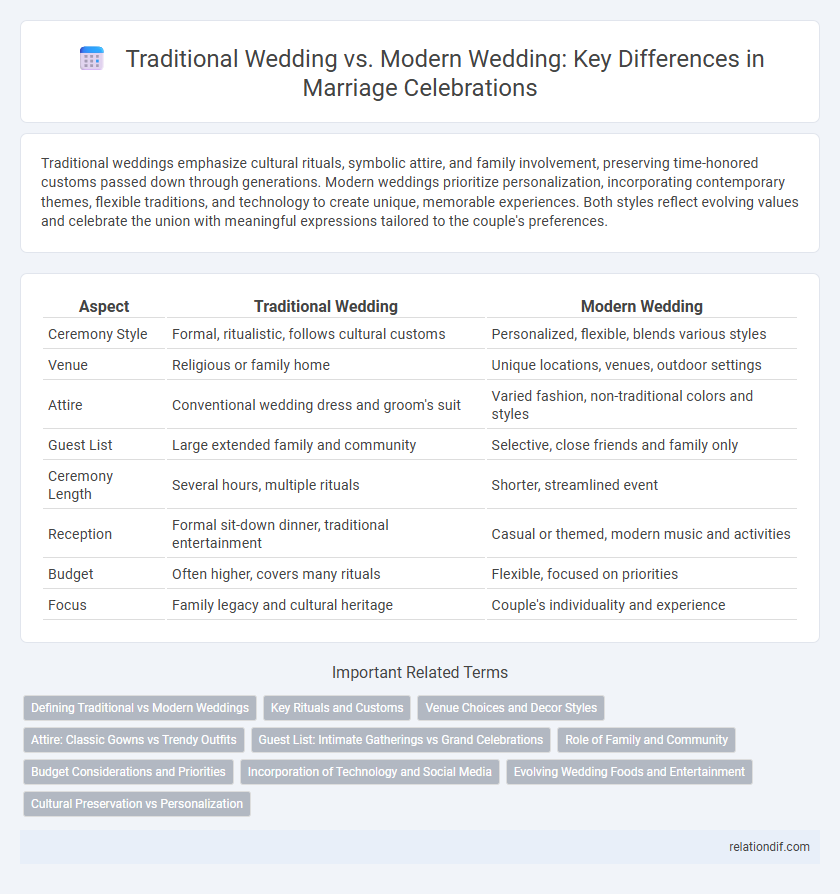Traditional weddings emphasize cultural rituals, symbolic attire, and family involvement, preserving time-honored customs passed down through generations. Modern weddings prioritize personalization, incorporating contemporary themes, flexible traditions, and technology to create unique, memorable experiences. Both styles reflect evolving values and celebrate the union with meaningful expressions tailored to the couple's preferences.
Table of Comparison
| Aspect | Traditional Wedding | Modern Wedding |
|---|---|---|
| Ceremony Style | Formal, ritualistic, follows cultural customs | Personalized, flexible, blends various styles |
| Venue | Religious or family home | Unique locations, venues, outdoor settings |
| Attire | Conventional wedding dress and groom's suit | Varied fashion, non-traditional colors and styles |
| Guest List | Large extended family and community | Selective, close friends and family only |
| Ceremony Length | Several hours, multiple rituals | Shorter, streamlined event |
| Reception | Formal sit-down dinner, traditional entertainment | Casual or themed, modern music and activities |
| Budget | Often higher, covers many rituals | Flexible, focused on priorities |
| Focus | Family legacy and cultural heritage | Couple's individuality and experience |
Defining Traditional vs Modern Weddings
Traditional weddings emphasize cultural rituals, religious ceremonies, and long-established customs that have been passed down through generations, often featuring specific attire, ceremonies, and community involvement. Modern weddings tend to prioritize personalization, flexibility, and contemporary trends, incorporating unique themes, non-traditional venues, and diverse expressions of commitment that reflect the couple's individual values. Defining traditional versus modern weddings involves contrasting adherence to heritage and structure with innovation and customization in the celebration of marriage.
Key Rituals and Customs
Traditional weddings emphasize customs such as religious ceremonies, cultural attire, and symbolic rituals like the exchange of garlands or vows in sacred spaces. Modern weddings often integrate personalized elements, including non-religious ceremonies, contemporary dress codes, and unique rituals like unity ceremonies or personalized vows. Both styles preserve meaningful traditions, yet modern weddings adapt key rituals to reflect individual values and diverse cultural influences.
Venue Choices and Decor Styles
Traditional weddings often take place in classic venues such as churches, historic estates, or cultural landmarks, featuring decor styles rich in heritage like intricate floral arrangements, lace accents, and ceremonial symbols. Modern weddings favor unconventional venues including urban rooftops, art galleries, or industrial spaces, with minimalist decor emphasizing clean lines, neutral palettes, and personalized elements. Selecting a venue and decor style reflects the couple's values, either honoring longstanding customs or embracing contemporary aesthetics.
Attire: Classic Gowns vs Trendy Outfits
Traditional weddings often feature classic gowns with intricate lace, long trains, and timeless silhouettes that emphasize elegance and heritage. In contrast, modern weddings embrace trendy outfits such as minimalist dresses, bold colors, unique cuts, and even non-white ensembles reflecting personal style and contemporary fashion trends. The choice between classic gowns and trendy attire highlights the evolving nature of wedding customs while honoring cultural significance.
Guest List: Intimate Gatherings vs Grand Celebrations
Traditional weddings often feature intimate gatherings with close family and lifelong friends, emphasizing meaningful connections and personalized interactions. Modern weddings tend to embrace grand celebrations, inviting larger guest lists that include extended acquaintances and colleagues to create a more festive atmosphere. Balancing the scale of the guest list impacts the overall experience, from venue choice and budget allocation to the depth of social engagement during the event.
Role of Family and Community
Traditional weddings emphasize strong involvement of family and community, with collective decision-making, rituals, and support systems that reinforce social ties. Modern weddings often feature a more individualized approach, prioritizing the couple's preferences while family and community roles become advisory or symbolic. Despite these changes, both styles highlight the importance of family blessings and communal participation to varying degrees.
Budget Considerations and Priorities
Traditional weddings often allocate a significant portion of the budget to elaborate ceremonies, formal attire, and large guest lists, emphasizing cultural customs and rituals. Modern weddings prioritize cost-efficiency by focusing on intimate gatherings, personalized experiences, and digital invitations, resulting in reduced expenses for venue and catering. Couples balancing budget considerations tend to blend both approaches, optimizing spending on key elements like photography and attire while minimizing extravagance.
Incorporation of Technology and Social Media
Traditional weddings often emphasize in-person ceremonies and printed invitations, while modern weddings integrate technology through live streaming services and digital RSVPs, making the event accessible to a broader audience. Social media platforms such as Instagram, TikTok, and Facebook enable couples to share real-time updates, hashtags, and photo albums, enhancing guest interaction and event visibility. Virtual reality and drone photography are increasingly incorporated to capture immersive and dynamic perspectives, setting modern weddings apart from conventional celebrations.
Evolving Wedding Foods and Entertainment
Traditional weddings typically feature classic dishes such as roasted meats, hearty sides, and rich desserts, reflecting cultural heritage and communal sharing, while entertainment often includes live bands playing folk music or formal dances like ballroom. Modern weddings embrace diverse and innovative menus, incorporating food stations, international cuisines, and personalized cocktails, paired with dynamic entertainment options like DJs, interactive photo booths, and choreographed performances that cater to varied guest preferences. The evolution of wedding foods and entertainment highlights the shift from rigid customs to customizable experiences that emphasize individual tastes and immersive celebrations.
Cultural Preservation vs Personalization
Traditional weddings emphasize cultural preservation by adhering to rituals, customs, and attire passed down through generations, reinforcing a community's heritage and identity. Modern weddings prioritize personalization, allowing couples to tailor ceremonies and celebrations to reflect their unique values, preferences, and contemporary lifestyles. Balancing these approaches can create meaningful experiences that honor ancestral traditions while embracing individual expression.
Traditional Wedding vs Modern Wedding Infographic

 relationdif.com
relationdif.com